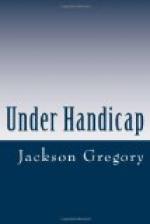And, together with the breathless heat of the still afternoon, the ache and dizziness returned to his head where Brayley’s gun had struck him; a new and growing nausea told him that a man is not knocked unconscious one day to forget all about it the next. As he straightened up from bending over the lowest wire, nausea and faintness together threatened to make him throw up his hands and acknowledge himself unfit for the new sort of existence into which he had rushed carelessly. He was not certain why, in spite of all that he felt, he held on. He knew only that as the son of William Conniston he must be the superior in all things to the man who worked at his side like a machine; he knew that in spite of his liking for Lonesome Pete he held the cowboy in a mild contempt, and that he must not be outdone by him.
When at length the sun had sunk out of sight through the flaming colors of its own weaving in the flat lands to the west, and Lonesome Pete threw down his tools at the foot of the last post which they had planted in the sandy soil, Conniston was too tired to greatly care that the day was done. He refused the proffered cigarette, and slowly walked away to where his horse was waiting for him. He did not know that the other man was looking at him curiously, that there was much amusement and a hint of surprise in the bright-blue eyes. He knew only that he had toiled from before sunrise until after sunset; that the waking hours to which he had been long accustomed had been turned topsy-turvy; that instead of spending money he had been making money; that he had earned his board and lodging and one dollar! And even while he ached and throbbed throughout his whole weary body he was vaguely amused at that.
When finally they came again into the Half Moon corrals Lonesome Pete carelessly offered to unsaddle for Conniston and water and feed his horse. And Conniston, while not ungrateful, answered with short doggedness that he could do his own part of the work.
They came to the bunk-house to find that several of the boys had eaten before them, that two or three of them were already in bed. The cook, however, had supper waiting for them, kept hot in the oven of his big stove. Conniston knew that he was hungry; during the ride in he had thought longingly of a hot meal and bed. But now he learned what it was to be hungry and at the same time too tired to eat. He drank some coffee, ate a little bread and butter, and, pushing his plate away, climbed into his bunk.
He thought longingly of silk pajamas and a hot bath—and started up finding himself half asleep, dreaming of miles of wire fence, of hammering staples and tightening wires, of laboring with breaking back over holes which, as fast as he dug them, filled with the shifting sand. And then—it seemed to him that he had been in bed ten minutes—he heard the cook rattling his pots and pans and stove-lids, and knew that the night had gone and that the second day of his new life had come.




